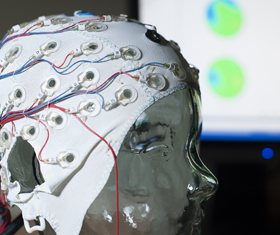New website aims to help adults recognise signs of mental health issues
Release Date 25 March 2014

A psychologist from the University of Reading has played a pivotal role in a project which aims to help adults become more aware of mental health issues in young children.
Professor Shirley Reynolds, Director of the University of Reading's Charlie Waller Institute for Evidence-Based Psychological Treatment, was a clinical lead on MindEd. Launched today, this new web resource will provide adults with the knowledge and skills to help address a lack of mental health awareness.
A new survey has found that more than a third of adults are unsure of signs of depression in children, and over half fear approaching the subject in case they are mistaken.
MindEd, funded by the Department of Health, contains bite-sized e-learning packages individually tailored to equip professionals and volunteers working with children and young people with the skills to identify children with a mental health condition.
As well as tackling stigma and giving adults access to information anytime and in any place, it aims to speed up the time it takes to identify child mental health problems and put them on the path to the most appropriate treatment.
Professor Reynolds said: "As adults we almost all come in contact with children and young people in our everyday lives. Teachers, nurses, doctors, police, social workers and sports coaches, as well as parents and other family members, all play an important role in raising healthy and happy children. Mental health problems are incredibly common before the age of 18 but most of us don't recognise these and, if we do, don't know what we can do to help.
"The MindEd website is free and available for everyone, including parents and family members. It includes information and education, written by experts, in straightforward and clear language, aimed to make us all feel more confident to help children and young people."
Commissioned by group of national organisations specialising in child and adolescent mental health, the survey of 2,105 UK adults found that 38% didn't know what signs and symptoms they needed to look out for, and if they did, 51% said they were worried about raising the issue for fear of being mistaken.
With over 850,000 children in the UK diagnosed with a mental health problem, the group warns that without increased education or awareness to help adults identify and understand children and young people with mental health issues, thousands are at increased risk of alcohol and drug misuse, self-harm, neglect and in extreme cases, suicide.
Dr Raphael Kelvin, Child Psychiatrist and Clinical Lead for the MindEd programme, said: "Half of all diagnosable mental health conditions start before the age of 14 and 75% by the age of 21, so identifying children at the earliest opportunity is crucial in setting them on the best path in life.
"Investing in early intervention is crucial - not doing so comes at a high price for those battling a mental health condition, and also costs the economy vast sums of money in lost education, training, jobs, and often, through crime.
"It's clear from these results that there's still stigma attached to mental health with 51% of adult admitting fear of approaching the issue. It's also clear that many adults are not confident in being able to spot the signs of ill mental health in children and many are turning to other adults - family, friends and teachers - for help and advice.
"So it's vital that people know what to look out for so they can address the issue before it worsens and that's where MindEd can help."
Minister for Care and Support, Norman Lamb, said: "Spotting the signs of mental health problems early in children and young people is essential to prevent problems from escalating and continuing into adulthood. That's why we have invested £3 million in MindEd - so that people working with children, from teachers to dinner ladies and sports coaches to Scouts leaders, can recognise when a child needs help and make sure they get it."
ENDS
Notes to Editors:
- MindEd, incorporates, and can be used alongside a range of other resources that aim to help address the challenges of child and adolescent health, and mental health. These include, the Children and Young Persons Improving Access to Psychological Therapies programme (CYP IAPT) and The Healthy Child Programme (HCP).
The MindEd Consortium comprises of: The Royal College of Paediatrics and Child Health (RCPCH), The British Psychological Society (BPS), The National Children's Bureau (NCB), The Royal College of General Practitioners (RCGP), The Royal College of Nursing (RCN), The Royal College of Psychiatrists (RCPsych) and YoungMinds.
And works in partnership with The British Association of Counselling and Psychotherapy (BACP) and HEE e-Learning for Healthcare
